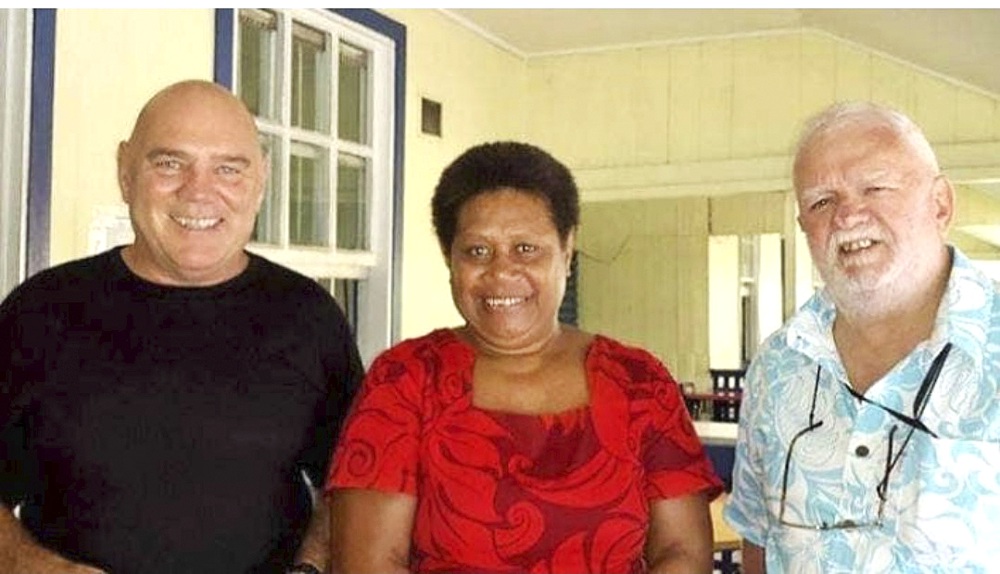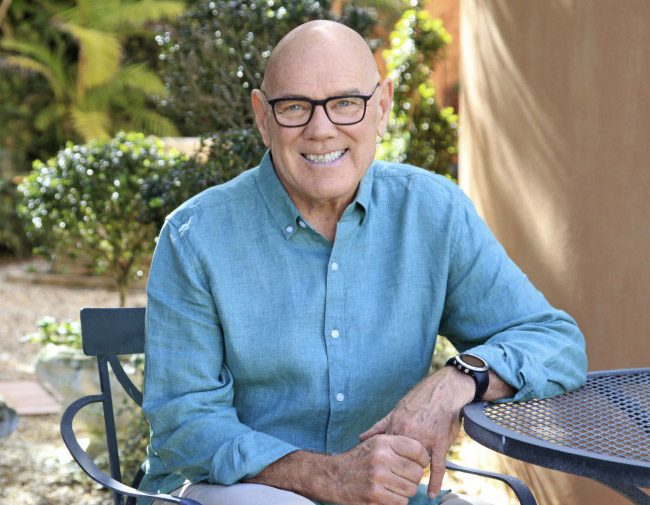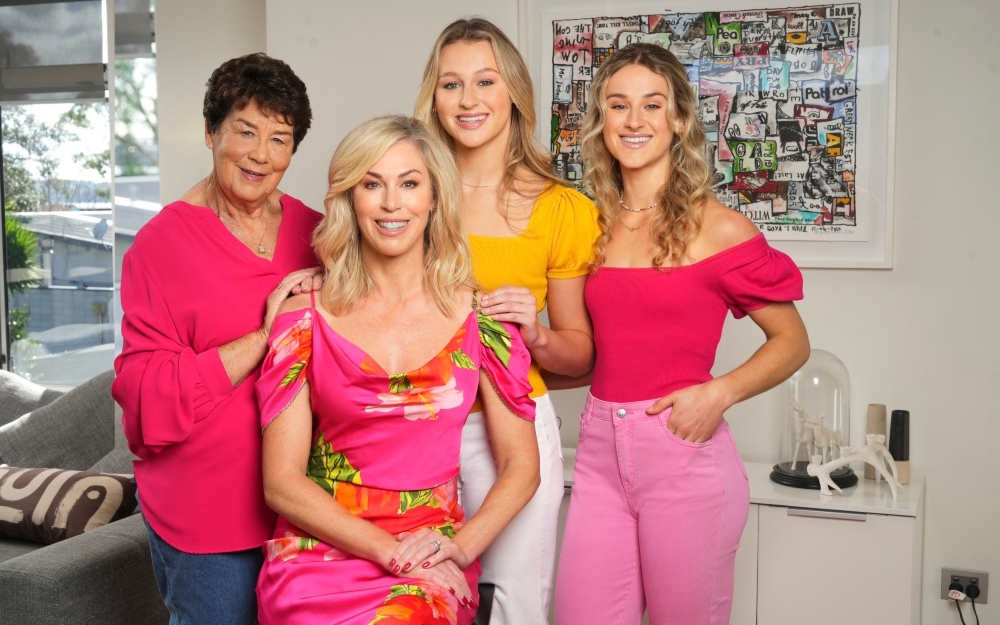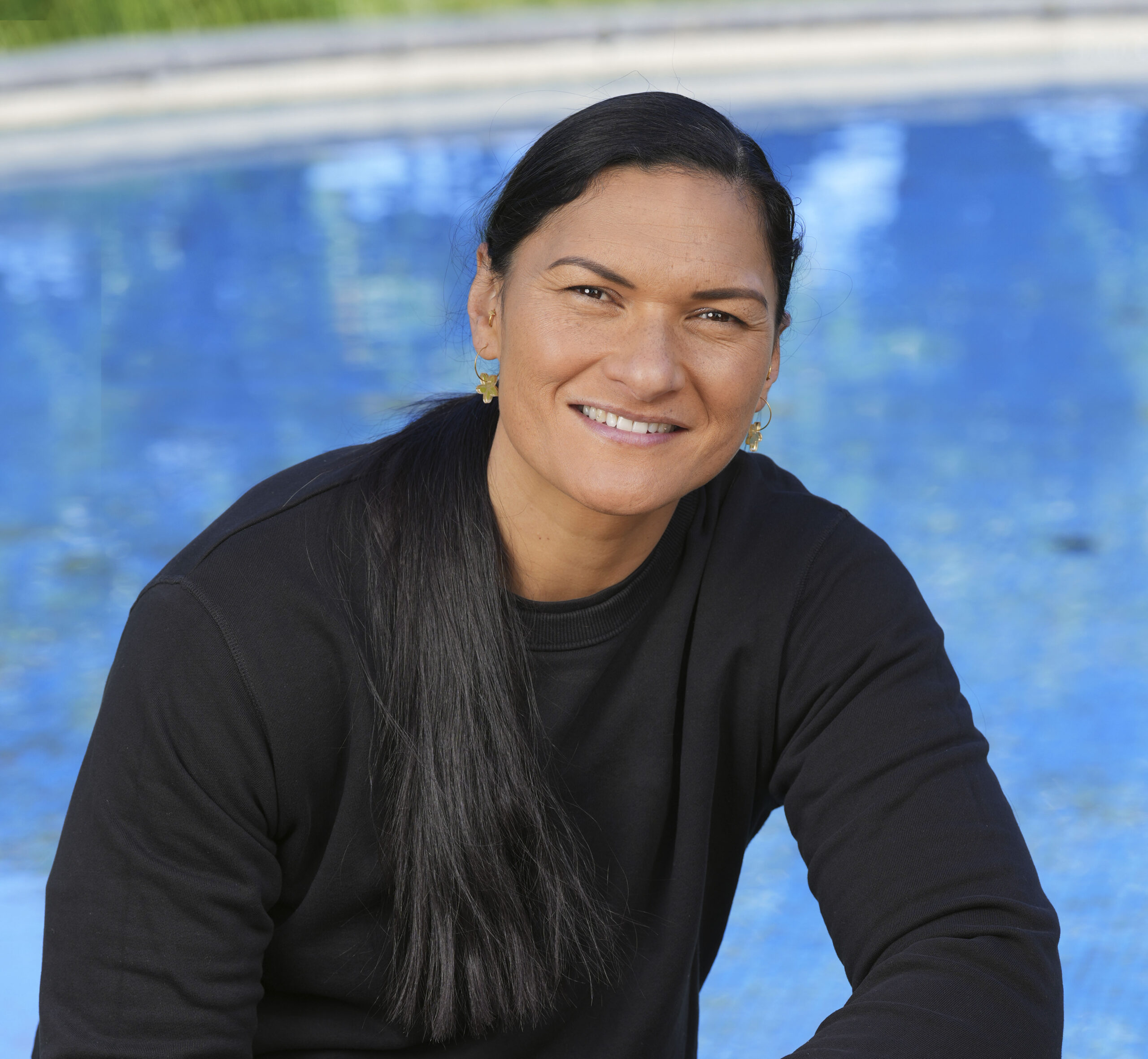The human locator beacon that is Kiwi investigative journalist David Lomas regularly travels the globe in search of answers to unsolved family mysteries.
But off screen, it’s not widely known there’s one country that’s significant in David’s life for his own family reasons – Fiji.
It was where he called home for eight of his first 16 years, when David’s father worked as an air traffic controller at Nadi Airport. And it’s where his older brother and mentor, Peter, is buried after sadly dying from Covid complications, aged 74, last year.
Peter, also a veteran journalist, was the publisher and editor of the Fiji Sun, ensuring the paper was relevant to all Fijians rather than just the educated and the expatriates.
Along with his late wife Venina, he was a key member of the Pacific Islands News Association (PINA), which helped with the training of almost every journalist in the region for many years.

Peter Lomas and his late wife Venina with David
Receiving the news in mid-2021 that his older brother had been admitted to the Covid ward in Suva’s Colonial War Memorial Hospital was terrible, David tells the Weekly.
“We were worried. After initially being in the Covid ward, he was in a coma in ICU and just never recovered. He passed away in March 2022,” explains the TV presenter, who had to view his brother’s funeral online due to lockdown restrictions in Fiji.
“Thankfully in February 2020, just as Covid started to appear in the world, I had some time off, so went to visit him. We went on a fun five-day road trip together – it was his decision – where we took the office car and I travelled with him around Fiji as he visited his paper’s branch offices.
“We went over to Labasa and Savusavu, and then we came back across to Rakiraki. Of course, I didn’t realise it at the time, but it turned out to be our farewell trip.”
David and his older brother Peter on their final road trip together in Fiji.
Asked what he misses most about his brother, David pauses thoughtfully before answering that it’s being able to text each other when their beloved Highlanders or Fiji rugby teams are winning.
“I miss our chats. It’s that funny thing that when your parents are gone and then all of a sudden your older brother is gone, it’s a bit of a mortality check.”
In his early journalism life, Peter worked in New Zealand on the Evening Star in Dunedin. At 20, while reporting for the Sunday News, he went to Fiji to visit his parents and never left.
So did his brother’s career in journalism then spark David’s interest as well?
“Well, it has to have, I suppose. Or there’s something in the family gene pool where we’re just very curious,” he muses.
“I had worked on the Fiji Sun when Peter was there and he got me to cover the Fiji rugby team. Way back then, I also infamously made the billboard of the Fiji Sun in the mid-1990s, which said, ‘Lomas Deported’.”

The Lomas children (from left): Peter, Roger, David and Janiene in Nadi in 1969.
According to the government at the time, but unknown to David who had visited Fiji just months earlier without trouble, he had been banned from entering the country.
The ban had been imposed after David had gone to Fiji and produced an investigative piece on the Fiji military for the TVNZ current affairs programme Assignment, which had upset the government.
“A couple of years before, I’d done this story on [Fijian military commander and former Prime Minister] Sitiveni Rabuka,” recalls David. “This was when he wasn’t in government. He’d already had his 1987 coup, but there was a suggestion he was going to have another one, so we went up to do a story.
“We played a round of golf with Rabuka and he agreed to do a story with us. But the government at the time was upset that we’d done this, so when they heard I was back up in Fiji, they kicked me out. Two policemen marched me down the plane and sat me in the back row. I felt like a criminal!”
These days, David has his work cut out for him, helping reunite Kiwis to their families around the world in emotional television moments. His popular programme, David Lomas Investigates, is back on our screens for a third series, where Fiji also happens to provide the backdrop for one of the stories he says he is most proud of.
The 70-year-old presenter even “roped in” a little help with research and language interpreting from his niece Losalini (Peter’s daughter).

David, niece Losalini and her husband Josua in Naimasimasi village.
“It’s just the most magic story,” smiles David. “It’s truly beautiful and is about a Fijian Indian chap, Dinesh, who now lives in Christchurch.
“In 1999, Dinesh was living with his family, who were cane farmers in Nadi. And each year when it was cutting season, Fijian highland villagers would travel to Nadi to do their seasonal work and cut the cane.
“Dinesh got to know one of the women, called Salome, from the highland villages, and they started going out. Things got serious and then she got pregnant. But it didn’t work out, so Salome disappeared.
“Dinesh, being the poor son of a cane farmer, didn’t have the money to do anything about it. He ended up in New Zealand but has always wanted to find this child of his. All he had to go on was her first name and that she came from a village called Naimasimasi in the Fijian hinterland.
“So I rang my niece and asked, ‘Can you solve this case for me?'” he says, laughing. “And she managed to fit me in.”
Even though church youth worker Losalini isn’t a trained journalist, she was raised in a household with journalists, points out David.
She and her husband Josua Mateiwai took it upon themselves to ask people who might be able to help. The mystery of what happened to Dinesh’s lost love child will be revealed later in the series.
“Catching up with Losalini over this story was really great, especially as I hadn’t been able to attend her wedding because it was during the Covid lockdown and I hadn’t seen her since her father died… two big events, which in normal circumstances, I should have been there for.”
Reuniting families since 2007 – with around 1500 applications requesting his help each year – David says there is nothing better than trying to crack a complicated story.
And yes, people often come up to him in public and pour out their often heart-rending adoption stories with him.
“Sometimes I feel like a priest during confession time! There was a lady I met in Nelson Airport who bailed me up and started telling me her story, and we found her family for the show. There’s a few like that over the years.
“You don’t get many jobs in the world where you can literally change people’s lives and not just one person, but lots of people.”
Quick fire
Can you share any memories from growing up in Fiji?
I’m sort of a fraud-Fijian because where we lived was Nadi Airport. Back in the 1950s and ’60s, Nadi Airport was like a little New Zealand town, with a lot of expats there. The primary school was run by New Zealand school teachers and the NZ Ministry of Education. My father was an air traffic controller. He’d been up in the Solomon Islands during the war and loved the tropics, so jumped at the chance to take his family to live in Fiji. I came home to New Zealand when I was six, and then Mum and Dad went back again when I was 14, and I stayed in Wellington at boarding school. But I was fortunate enough to spend my long Christmas school holidays in Fiji, as well as a couple of the shorter holidays.
What’s the craziest place you found yourself looking for someone?
A chicken farm in Ecuador. That was for the Lost and Found series. We were looking for an old Frenchman and we tracked him down to a little village in Ecuador, right on the Amazonian rainforest border. This guy was sitting in his underpants, surrounded by chickens, waving his hands and saying, “Ello Ello!”
How has the show had an impact on you personally?
Well, the show has made me a much better driver because I can’t just go [David demonstrates giving the middle finger] on my Vespa scooter in case I get recognised. Occasionally I forget!
Watch David Lomas Investigates, Wednesdays, 7.30pm on Three or stream on ThreeNow.


